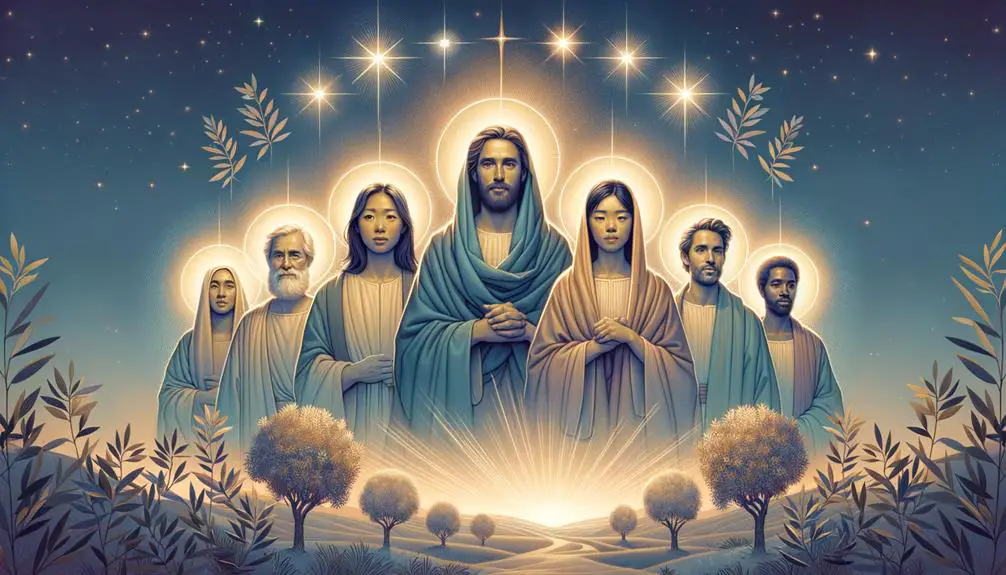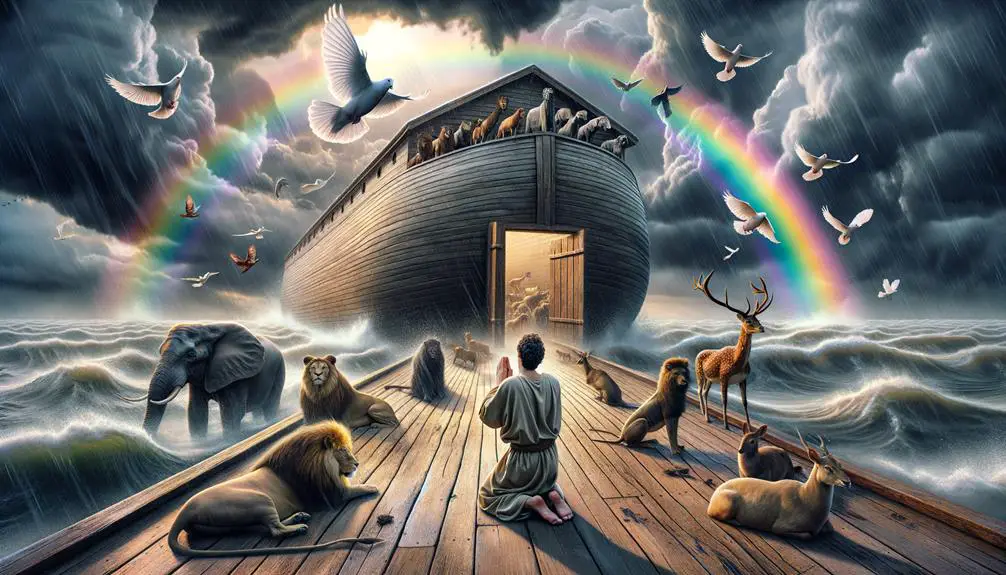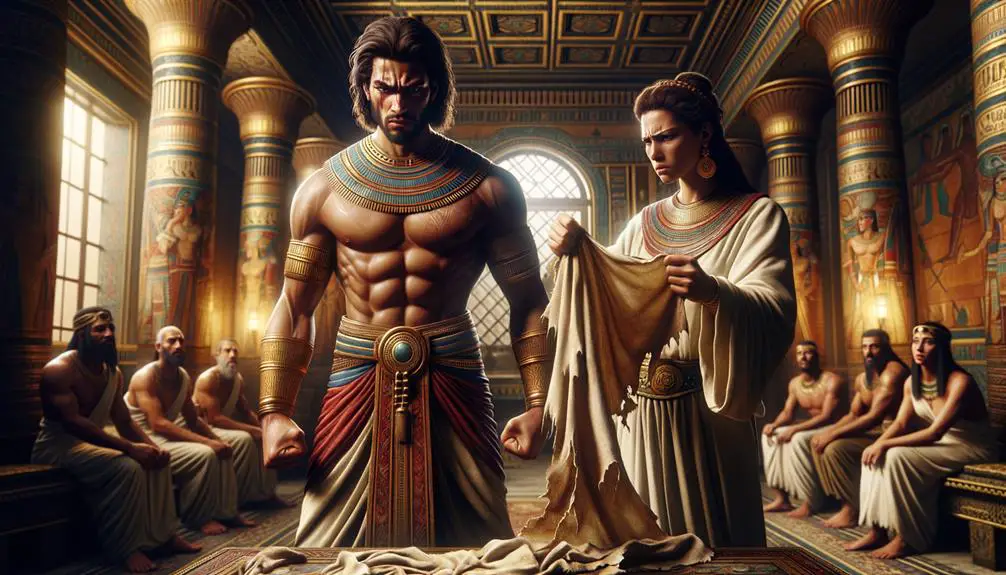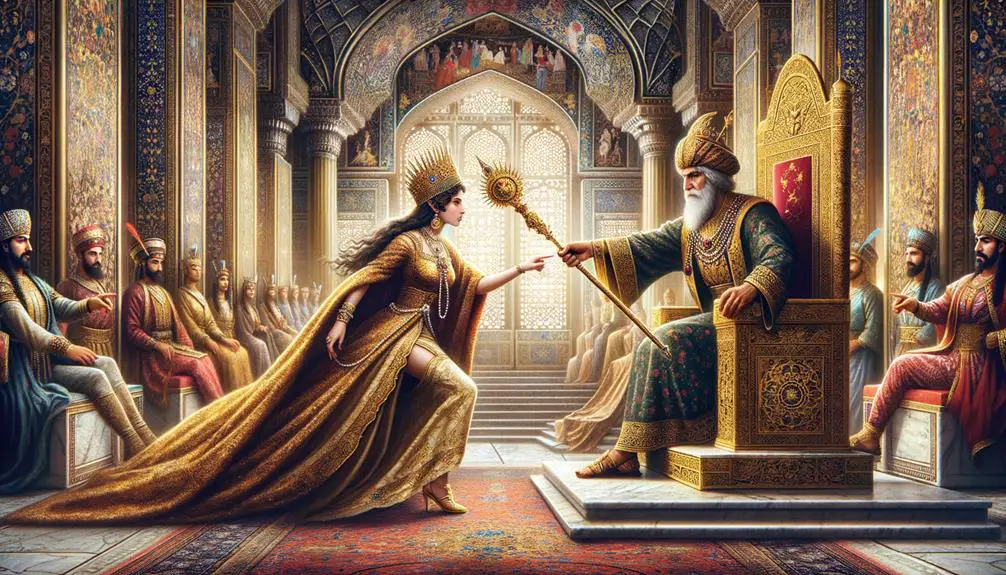Biblical tales of righteousness from Noah to Joseph reveal profound lessons on faith and integrity, inviting you to explore their timeless stories.

Who Was Righteous in the Bible
When you think of righteousness in the Bible, Noah often comes to mind first, thanks to his unwavering faith amidst a corrupt world. But he's just the tip of the iceberg. Figures like Abraham, who was called a friend of God, and Joseph, whose integrity led him from a pit to a palace, also set compelling examples of righteousness.
Each of these individuals faced unique trials that tested their faith and moral compass in profound ways. As you explore their stories further, you'll uncover how their responses to these challenges not only defined their character but also offer timeless lessons on living a life of faith and integrity.
Key Takeaways
- Righteousness in the Bible is often demonstrated through unwavering faith, obedience, and integrity in the face of trials.
- Figures like Noah, Abraham, Moses, Joseph, and Daniel exemplify righteousness through their steadfast loyalty and moral fortitude.
- Divine favor and deliverance are recurrent themes for those who maintain righteousness, showcasing the rewards of faith and integrity.
- Leadership, courage, and wisdom are pivotal traits of the righteous, guiding them to inspire change and stand up for justice amidst adversity.
Noah's Unwavering Faith

Among the pantheon of biblical figures, Noah stands out for his unwavering faith, demonstrating an unparalleled commitment to God's directives amidst prevailing skepticism. Your exploration into Noah's narrative reveals a profound embodiment of obedience and trust. The ark construction, a monumental task entrusted to Noah, signifies not merely an act of survival but a profound adherence to divine will in the face of widespread disbelief and mockery. Imagine yourself in Noah's position, tasked with a seemingly insurmountable challenge, yet fueled by an unwavering faith in the divine covenant.
This covenant, a promise of salvation and a new beginning, underscores the reciprocal nature of Noah's relationship with God. It wasn't just about Noah's survival but about establishing a precedent for future generations, illustrating the rewards of faithfulness and the consequences of deviation. Your reflection on this narrative prompts a deeper understanding of faith's role in confronting and overcoming adversity. Noah's story, therefore, isn't just historical but serves as a timeless testament to the power of faith and obedience.
As you delve further, you observe that the divine covenant extends beyond mere survival; it encompasses a moral rebirth for humanity. The ark's construction, thus, is symbolic of the foundational principles upon which a new world would be built, anchored in righteousness and divine favor. Noah's unwavering faith, in this context, isn't just an act of personal salvation but a cornerstone in the history of human-divine interaction, a beacon for those who seek to navigate the tumultuous waters of moral dilemmas and existential challenges.
Abraham: Father of Nations
Turning our attention to Abraham, often hailed as the Father of Nations, we find a figure whose journey encapsulates the essence of faith, obedience, and the forging of a covenant that would shape the destiny of countless generations. Abraham's path wasn't just a literal journey from Ur to Canaan, but a spiritual voyage that demonstrated unwavering trust in the divine. His life, marked by episodes of profound faith and moments of human frailty, offers a rich tapestry for reflection.
Abraham's hospitality and sacrificial faith stand out as monumental pillars in his story. He welcomed strangers, showing us the profound impact of generosity and kindness. His willingness to sacrifice Isaac, his beloved son, upon God's command, though a deeply troubling episode, highlights the depth of his faith and obedience. This act of sacrificial faith isn't just a testament to Abraham's devotion but a complex moment of theological and moral reflection.
To evoke emotion and deeper understanding, consider these elements:
- *Abraham's unwavering belief in the promises made to him, despite his advanced age and Sarah's barrenness.*
- *The profound anguish and resolve in Abraham's heart as he ascended Mount Moriah with Isaac.*
- *The joyous relief and reaffirmation of faith following God's intervention to spare Isaac.*
- *The hospitality Abraham showed his visitors, unknowingly entertaining angels.*
- *The legacy of Abraham as a patriarch, whose faithfulness became the foundation for three major world religions.*
Reflecting on Abraham's life, we're reminded of the complexity of faith, the virtue of patience, and the power of a promise that transcends generations.
Joseph's Righteous Integrity

You'll find Joseph's narrative compelling, notably his unwavering integrity amidst trials. His resistance to temptation and the transformative journey from imprisonment to honor underline a profound moral steadfastness.
This trajectory not only showcases his righteousness but also serves as a pivotal lesson in ethical persistence and divine favor.
Joseph's Temptation Resistance
Joseph's steadfast refusal to succumb to temptation showcases his unwavering integrity and marks a pivotal moment in his narrative. His journey, shaped by dream interpretation and his brothers' betrayal, takes a dramatic turn when faced with a moral challenge. This episode not only highlights his righteousness but also his profound resilience.
- Joseph's resistance evokes admiration for his moral fortitude.
- It stirs empathy for his isolation and the trials he endures.
- The incident arouses reflection on personal integrity in the face of temptation.
- It inspires contemplation on the strength required to uphold one's principles.
- Joseph's choice ignites a sense of hope in the power of righteousness to overcome adversity.
Analyzing Joseph's decision in this light, we uncover layers of meaning about character, virtue, and the human spirit.
Imprisonment to Honor Journey
Facing unjust imprisonment, Joseph's journey from confinement to a position of honor underscores his unwavering integrity, even in the darkest circumstances. His story isn't just a testament to personal fortitude; it's a blueprint for prison reform, highlighting how moral resilience can transform an individual's fate.
Within the gloomy walls of his cell, Joseph didn't succumb to despair. Instead, he harnessed his moral resilience, becoming a source of wisdom and leadership. This not only led to his eventual release but also to his extraordinary rise to power in Egypt.
Joseph's narrative demonstrates that integrity and moral resilience can't only navigate one through personal trials but can also inspire systemic change, laying the groundwork for a more humane and rehabilitative approach to imprisonment.
Moses: Deliverer of Israel
As you explore Moses' journey, consider how his early years set the stage for his role as the leader of Israel's Exodus. His upbringing in Pharaoh's court equipped him with unique insights and skills, yet it was his profound connection to his Hebrew roots that propelled him toward his destiny.
Reflect upon the complexities of Moses' identity and leadership, which underscore the multifaceted nature of divine calling and human response.
Moses' Early Years
Moses' formative years, marked by a dramatic rescue and a privileged upbringing in Pharaoh's court, set the stage for his pivotal role as the deliverer of Israel. Before encountering the burning bush or leading his people, Moses navigated life as an Egyptian prince, imbued with knowledge and culture yet alienated by his Hebrew heritage. This duality fostered a unique perspective, equipping Moses for his future tasks.
- The basket among the reeds symbolizes vulnerability and divine protection.
- Adopted by Pharaoh's daughter, a twist of fate intertwines privilege and destiny.
- His inner turmoil, torn between two worlds, evokes empathy.
- The act of killing an Egyptian oppressor highlights Moses' impulsive pursuit of justice.
- Fleeing to Midian, the forge of his character and faith preludes his prophetic calling.
Leading Israel's Exodus
The pivotal moment in the narrative of the Israelites, their exodus from Egypt, showcases not only a physical journey but a profound transformation under the leadership of Moses. You witness Moses' encounter with the divine at the burning bush, a theophany that not only commissions him but also sets the stage for the liberation of the Israelites.
This episode is critical in understanding Moses' role as a mediator between God and his people. The subsequent plague narratives further illustrate Moses' unique position, where each plague serves as a testament to his righteousness and steadfast faith in God's power.
Through these narratives, you're invited to reflect on the complexities of faith, leadership, and the pursuit of freedom, all embodied in the figure of Moses, the deliverer of Israel.
Esther's Courageous Intercession

Esther's courageous intercession, marked by her willingness to risk her own life, showcases a pivotal moment of advocacy and faith in the face of potential genocide. Emerging as queen from a royal banquet and beauty contest, Esther's initial role appears as one of privilege and passivity within the Persian empire. However, her narrative pivots dramatically upon learning of a plot to exterminate her people. Faced with a harrowing choice, Esther embodies a profound resilience and strategic acumen.
- *Esther's decision to approach the king without being summoned could have led to her execution, highlighting her sheer bravery.*
- *Her strategic use of two banquets to reveal Haman's plot demonstrates not only courage but profound wisdom.*
- *The emotional weight of potentially losing her people adds a palpable tension to her actions, enhancing the emotional impact of her story.*
- *Esther's reliance on fasting and prayer before taking action underscores her deep faith and the spiritual dimensions of her courage.*
- *Her success in averting genocide brings a powerful sense of relief and victory, both to her and the audience.*
Through Esther's narrative, one discerns the intricate balance between faith, courage, and strategic action in confronting oppressive power structures. Her story transcends time, urging you to reflect on the importance of standing up for justice, even when the stakes are high. Esther's legacy is a testament to the power of individual action in the face of overwhelming adversity, inspiring generations to act courageously and righteously.
Daniel's Steadfast Loyalty
Shifting our focus to another exemplar of faith, Daniel's steadfast loyalty emerges as a beacon of integrity and devotion amidst the trials and tribulations of Babylonian captivity. You'll find his journey in the Hebrew Bible, where his unwavering faith in God not only sustains him but also elevates his stature in a foreign land.
Daniel's narrative is rich with moments that test his loyalty to God. Perhaps most famously, you're reminded of the lion's den. This event isn't just a tale of survival; it's a profound testament to Daniel's faith. Despite the decree that all prayers should be directed only to the king, Daniel refuses to compromise his devotion. His subsequent punishment, being thrown into a den of lions, ends not in tragedy but in divine deliverance. This miraculous survival underscores the power of steadfast faith and God's protection over those who remain loyal.
Moreover, Daniel's ability to interpret prophetic dreams sets him apart. These dreams, laden with foresight and divine messages, further exemplify Daniel's deep connection with God. His interpretations aren't merely acts of intellect; they're demonstrations of his spiritual insight and unwavering belief in God's sovereignty.
Analyzing Daniel's life, it's clear that his steadfast loyalty wasn't without its challenges. Yet, it's this very loyalty that not only preserved him in moments of peril but also allowed him to serve as a conduit for God's messages. Daniel's experiences, particularly in the lion's den and with prophetic dreams, serve as compelling evidence of how unwavering faith can lead to divine favor and deliverance.
Job's Persevering Righteousness

In the midst of adversity, Job's unwavering righteousness stands as a profound lesson on the endurance of faith. As you delve into his story, you're invited to reflect on Job's patience and the profound lessons suffering can teach.
Job, despite losing everything dear to him, never lost faith in God's justice and goodness. His story isn't merely about suffering; it's about maintaining righteousness in the face of inexplicable pain and loss. Job's patience is legendary, but it's his understanding of suffering's lessons that offers the deepest insights. Through his trials, Job learns about the complexity of the human condition, the limits of human understanding, and the unfathomable wisdom of God.
To evoke emotion and deepen your reflection, consider these aspects of Job's story:
- *Job's refusal to curse God despite severe provocation by Satan and his friends.*
- *The depth of Job's despair, which didn't lead him to abandon his faith.*
- *Job's honesty in expressing his anguish and confusion to God.*
- *The transformation in Job's understanding of righteousness, from a transactional to a relational perspective.*
- *God's ultimate vindication of Job, not for his patience alone, but for his unwavering integrity in the face of unknowable suffering.*
Analyzing Job's story, you're compelled to appreciate the complex relationship between faith, righteousness, and suffering. Job's enduring righteousness in the wake of his trials teaches that true faith isn't a fair-weather friend but a steadfast companion through the darkest valleys.
Frequently Asked Questions
How Do Contemporary Scholars Interpret the Concept of Righteousness in the Context of Biblical Narratives, and Does It Differ From Traditional Understandings?
You're delving into how scholars interpret righteousness in biblical stories today, and it's quite a shift from old views. Scholarly perspectives often incorporate moral relativism, suggesting that what's considered 'righteous' isn't fixed but can vary.
This nuanced approach contrasts with traditional, more absolute interpretations. You're reflecting on an evolution in understanding, where context and cultural shifts play a significant role in redefining what being righteous really means in these narratives.
Can the Concept of Righteousness in the Bible Be Applied to Modern Ethical Dilemmas, and if So, How?
Absolutely, 'as old as the hills' yet ever relevant, the concept of righteousness in the Bible offers a timeless guide to modern ethics. It transcends ethical relativism by providing foundational principles applicable in today's complex dilemmas.
Reflectively, through scholarly analysis, you'll find its teachings on justice, mercy, and humility not only applicable but essential in navigating the murky waters of contemporary ethical challenges. It's a beacon of moral clarity in a sea of relativism.
Are There Examples of Women Besides Esther Who Are Considered Righteous in the Bible, and What Roles Do They Play in Their Respective Stories?
Yes, there are several women besides Esther considered righteous in the Bible, who also embody female leadership and reflect diverse cultural perspectives. For instance, Ruth and Mary (Mother of Jesus) play pivotal roles.
Ruth's loyalty and devotion showcase moral fortitude, while Mary's faith and obedience highlight her righteousness. Analyzing their stories, you'll find a rich tapestry of values and ethics that transcend time, offering insights into leadership and righteousness from a female perspective.
How Does the Concept of Righteousness Vary Between the Old Testament and the New Testament, and What Implications Does This Have for Christian Theology?
You're exploring how righteousness evolves from the Old to the New Testament, highlighting shifts in Covenantal Faithfulness and Divine Justice.
In the Old Testament, righteousness is often tied to law adherence and national identity.
The New Testament reinterprets this through Jesus' teachings, emphasizing love, mercy, and faith.
This transition challenges you to reflect on Christian theology's core, questioning how these interpretations impact understanding of divine relationships and moral responsibilities today.
In What Ways Do Non-Biblical Historical Sources Corroborate or Challenge the Biblical Accounts of the Individuals Deemed Righteous in the Scriptures?
You might think it's all ancient tales, but when you dive into non-biblical historical sources, they often either support or question the stories of those deemed righteous. Archaeological evidence and examinations of historical accuracy invite you to reflect deeply.
They don't just affirm; they challenge, making you ponder the veracity and implications of these narratives. It's a scholarly journey, analyzing how these external accounts align or differ from the biblical portrayal, enriching your understanding.
Conclusion
In reflecting on these biblical figures, it's clear that righteousness isn't merely about flawlessness but about unwavering faith and integrity amidst trials.
Isn't it remarkable how, from Noah to Job, each individual's journey underscores a profound commitment to their beliefs in the face of adversity?
Their stories, deeply embedded in the fabric of faith, invite us to ponder our own paths toward righteousness. Indeed, their legacy challenges us to question: How does our faith shape our response to the trials we face?



Sign up